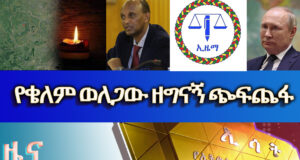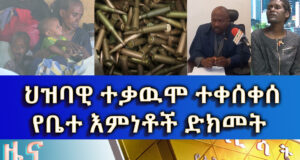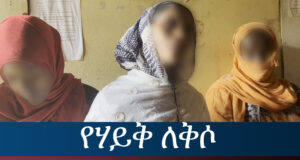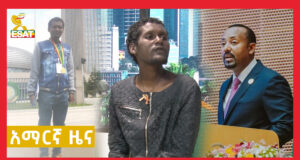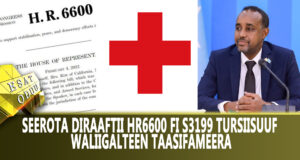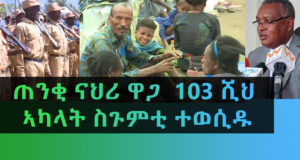Tony Hall, Director-General
British Broadcasting Corporation
Dear Mr. Tony Hall,
First of all, I would like to express my appreciation for the high standard the BBC is known for globally.
Having said that, I am writing today to bring to your attention factual errors, lack of balance and objectivity in BBC’s November 12 feature story, A year in fake news. 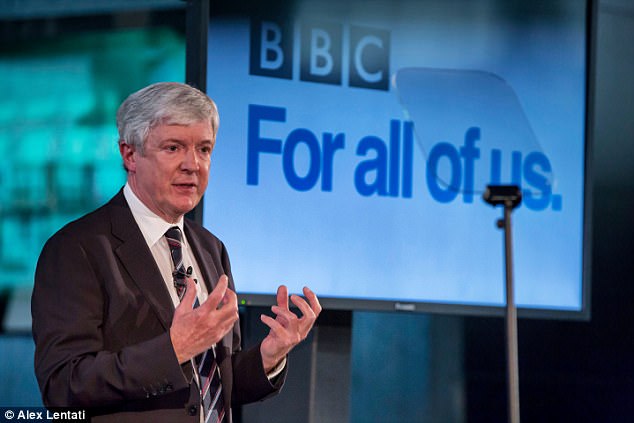 [https://www.bbc.com/news/world-africa-46127868].
[https://www.bbc.com/news/world-africa-46127868].
The story in question, which was produced in English, Amharic and Afaan Oromo languages, woefully fails to live up to the guiding values and principles of the BBC in the way it portrayed the Ethiopian Satellite Television (ESAT) and reported how a doctored video clip, which was actually produced and distributed by a third-party on social media, found its way in our programing.
BBC’s Editorial Guideline asserts that the BBC is “independent, impartial and honest.” The guideline also states that the BBC makes utmost efforts to establish truth and, thereby, produce contents that are accurate, balanced, fair and objective.
Despite its best efforts, we are also aware of the fact that the BBC has never been perfect or free from errors, controversies and accusations of bias. A glimpse of of BBC’s major corrections and clarifications webpage reveals the fact that the BBC has made numerous corrections and clarifications over the years. [www.bbc.co.uk/helpandfeedback/corrections_clarifications/]
Since its launch eight years ago by a group of exiled Ethiopian journalists, some of whom were jailed and tortured for speaking truth to power, ESAT has emerged as a powerful voice and torchbearer of freedom serving Ethiopians back home and in the Diaspora. In spite of repeated jamming efforts to silence it, ESAT remained resilient and steadfast in making immense contributions to the ongoing reform and political change in Ethiopia. That is the very reason why it earned the respect of millions of ordinary people who refer to ESAT as “the ear and eye” of Ethiopia.
Regardless of its popularly, ESAT has also a policy of making corrections whenever our standards are found to have not been met and errors are made. To that end, ESAT makes every effort to produce contents that are factual, accurate, balanced and objective. As a responsible public media, ESAT also prides itself of taking corrective actions whenever any contents we produce and air are found to have fallen short of our editorial guidelines and standards.
On July 18, 2018, Eletawi, a current affairs program, had a Facebook Live discussion on the consequences of ethnic conflicts in Ethiopia. Unfortunately, a producer decided to play a video clip, which was shared on social media, to show the horrific nature of such conflicts especially between ethnic Oromos and Somalis. The conflict had already caused massive displacement, damages to property and senseless killings. Nevertheless, it came to the attention of our editors, immediately after the video clip was shown, that it was actually doctored from the original. It turned out that the video clip, which had already been making rounds on social media, should not have been used without a process of verification that ESAT always requires its journalists and producers to do.
Without regard to the aforementioned facts, the BBC story in question says, “In July, the US-based Ethiopian Satellite Television (ESAT) station broadcast a video which it said showed ethnic Oromos in Ethiopia pushing the bodies of ethnic Somalis into a shallow grave.
“The BBC’s Afaan Oromo language service reported that the broadcast and subsequent widespread circulation of the video on social media in Ethiopia resulted in deadly attacks on ethnic Oromo people living in neighbouring Djibouti and Somalia. Oromo refugees in neighbouring Djibouti told the BBC that they had been beaten and their shops looted after the video was aired there.”
It concludes, “After an uproar on social media with many questioning its authenticity, ESAT admitted that the video was not real and described it as “deliberately misleading” in an official apology on its YouTube channel.”
Contrary to what the BBC story claims:
- ESAT did not produce the video clip in question. It was shared to an ESAT producer by a source. For instance, the time stamp on this Facebook post of the video shows July 14, which is four days earlier than ESAT’s live Facebook discussion.
- ESAT never produced a news story based on the video clip, which was only shown during a discussion on Facebook Live.
- ESAT did not doctor or add any voiceover or sound clip. It can be proven effortlessly that the video clip in question had been circulating on social media several days earlier than ESAT’s Facebook live streamed discussion that featured the clip.
- ESAT took swift action and removed the problematic video clip and the segment of the discussion within a few minutes after it was shown on a Facebook Live streaming.
- There is no evidence to show that the video gained “widespread circulation.”
- ESAT immediately removed the video clip from Facebook and as a result it was neither published on our website nor was it aired on TV.
- As the video clip was not broadcast on TV, contrary to what the BBC Afaan Oromo section was quoted as saying, there resultant effect was totally exaggerated to have caused attacks and lootings against ethnic Oromos.
- The truth of the matter is that ESAT had already reported that attacks against Oromos happened in Djibouti after five nationals of Djibouti were reported to have been killed in Dire Dawa, a city in South East Ethiopia.
- As a responsible media outlet, we sincerely apologized to our audience in a timely manner. Our apology was mainly for ESAT’s failure to properly check and verify the source as well as the authenticity of the video clip.
- The BBC report inferred as if ESAT took ownership of the video and said in its apology that the video was not real and “deliberately misleading”. This by itself is a totally misleading story-line as ESAT clearly stated in its apology that the video was made by a third party but, whatever the case, ESAT failed to verify the authenticity of the clip.
What is even more disturbing was the fact that no BBC reporter reached out to ESAT to verify the damaging claims or include our side of the story. Instead of doing so, BBC chose to include ESAT among an unflattering list of “fake news” producers. As one can easily judge from the facts listed above, the BBC report in question fails to meet BBC’s editorial guidelines and standards. As a matter of fact, ESAT suspects that the reporter or reporters involved from BBC Ethiopia section might have an ulterior motive of tarnishing ESAT’s hard-won reputation.
Taking the above facts into consideration, ESAT requests the BBC Trust to kindly investigate the matter seriously and make appropriate corrections as the segment of the story related to ESAT was unfair, unbalanced and biased.
I look forward to your prompt response to address our complaints as BBC’s Director General and Editor-in-Chief.
Best regards,
Abebe Gellaw
Executive Director
 The Ethiopian Satellite Television and Radio (ESAT) No. 1 Ethiopian news media: Esat, Ethiopian news, daily Ethiopian news, ESAT tv, ESAT Radio, Ethiopia
The Ethiopian Satellite Television and Radio (ESAT) No. 1 Ethiopian news media: Esat, Ethiopian news, daily Ethiopian news, ESAT tv, ESAT Radio, Ethiopia
